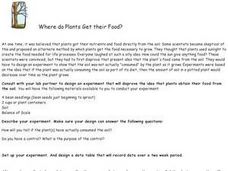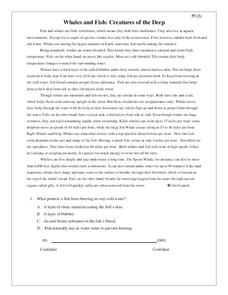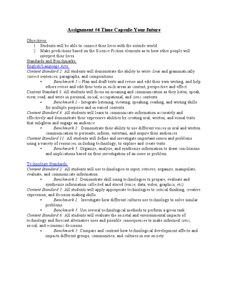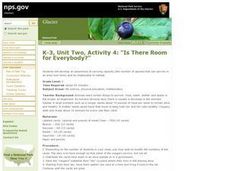Curated OER
Penguins Around the World
Students investigate penguins. In this Science lesson, students compare and contrast penguins to flying birds. Students use a Venn diagram to illustrate the differences and similarities of penguins and flying birds.
American Museum of Natural History
What Do You Know About PaleontOLogy?
Believe it or not, some dinosaurs are not extinct. Discover this and other interesting facts about dinosaurs in a 10-question online quiz. As individuals answer questions, the resource provides them with feedback and additional facts...
Baylor College
Plant or Animal?
Teach your class about the necessities of life using the book Tillena Lou's Day in the Sun. After a teacher-read-aloud, students make puppets depicting different plants and animals from the story and illustrating the habitat in...
American Museum of Natural History
Saving Species
Some scientists dedicate their lives to researching and protecting endangered species. An online lesson teaches about three scientists around the world who do just that. They learn about spiders, mollusks, and reptiles from North...
Curated OER
Microfishing
Students use a simple method to collect living microorganisms from natural and/or artificial environments and develop skills in microscopy, observation, drawing, speculation, hypothesizing, oral presentation, and raising questions.
Curated OER
Earth's Heavenly Treasures: Hummingbirds
Young ornithologists watch an informative video and use the Internet to gather data about the life, size, habitat, and migration of hummingbirds. The interdisciplinary lesson includes activities that target art, science, math, and...
Curated OER
Where Do Plants Get Their Food?
Plants need food to survive, just like any other living organism. Young biologists analyze an experiment performed in 1610 by Jan van Helmont to determine if plant nutrition is obtained through the soil. First, lab groups work together...
Curated OER
THE CELL: DESIGN AND FUNCTION
After studying the structure and functions of living cells using textbooks, internet or encyclopedias, young scholars prepare a PowerPoint presentation on cell structure and present it to the class.
Curated OER
Whales and Fish: Creatures of the Deep
Practice comparing and contrasting details in informational text with a reading passage about whales. It explains the ways that fish and whales are similar, as well as the ways they are different, and specific characteristics of various...
New South Wales Department of Education
Photosynthesis
Venus fly traps photosynthesize and consume insects because the soil they live in does not provide enough nutrients. Scholars analyze historical scientific experiments to learn how scientists discovered photosynthesis. From their...
Center Science Education
The Nitrogen Cycle Game
Earth science experts learn about the roles of nitrogen by taking a virtual journey through the nitrogen cycle. Completing a passport worksheet along the way, they move from place to place around the classroom by the toss of dice. Each...
LABScI
Botany: The Plant Dissection Lab
Study everything about plants! The 12-part series of lessons continues with an examination of many aspects of plants. Components of the laboratory activity address the growth and structure of plants by evaluating familiar plants. The...
Science Matters
Crawly Composters
Get your hands dirty with an interactive lesson plan that showcases the process of decomposing and returning nutrients back into the soil. After building a compost pile, pupils regularly observe the...
Curated OER
Assignment #4 Time Capsule-Your Future
Class members create a PowerPoint presentation showing artifacts they would include in a time capsule. The artifacts and explanations reflect personal hobbies, grooming choices, school life, etc. A great way for class members to...
Curated OER
Cut and Paste Food Chain
Students study life science. In this food chain lesson plan, students discover the different types of animals that make up an ecosystem. They discuss as a class and then work independently on a food chain activity. This lesson plan...
Curated OER
Is There Room for Everybody?
Third graders examine the capacity of animals able to live in one habitat. In this habitat lesson, 3rd graders play a game that shows the food chain and the interactions between animals in an area. Students discover that food is a major...
World Wildlife Fund
Arctic Food Chain
Explore the food chains that support Arctic ecosystems. A class discussion on interdependence and the different roles plants and animals play in ecosystems provides young scholars with the knowledge to complete a worksheet asking them to...
Grapevine Colleyville Independent School District
Mitosis Claymation Lab Instructions and Rubric
A single-paged set of instructions and grading system for a mitosis project are laid out for your life science learners. (Note that the page is repeated, making this a two-page document.) Pairs of beginning biologists use clay to model...
NOAA
Deep-Sea Ecosystems – Entering the Twilight Zone
Imagine an ecosystem without any light or oxygen, where living things convert carbon dioxide into food. This ecosystem is thriving and might just be the largest ecosystem on our planet, yet we know very little about it. The lesson...
Cornell University
Bacteria Take Over and Down
Bacteria outnumber all other forms of life on Earth. Scholars observe the growth of bacteria in petri dishes to understand their role in maintaining good health. Then, they observe the growth of bacteria after they introduce...
Curated OER
Vaccines
Students explore and explain the role of vaccines in infectious disease, They emphasize immunological principles and viral/bacterial infection processes. Students explore the three main vaccine types: DNA vaccines ("gene gun"),...
Curated OER
Saving Sturgeon
Marine biology apprentices interpret data of sturgeon interaction with gill nets. They use the data to calculate the percentage of fish entangled in each twine size to discover if there is any correlation. This is a valuable exercise in...
Curated OER
Stressed Out!
Have your class engage in lessons on earthquakes. Learners explore the science behind earthquakes using interactive websites and video clips. Then, they review the layers and parts of the Earth before delving into the causes of...
Curated OER
Let's go to the Video Tape!
Using actual data from a deep-sea video survey, high school marine biologists consider the biodiversity, compare species richness between two communities, and learn to calculate the diversity index. The lesson plan is all-inclusive,...























